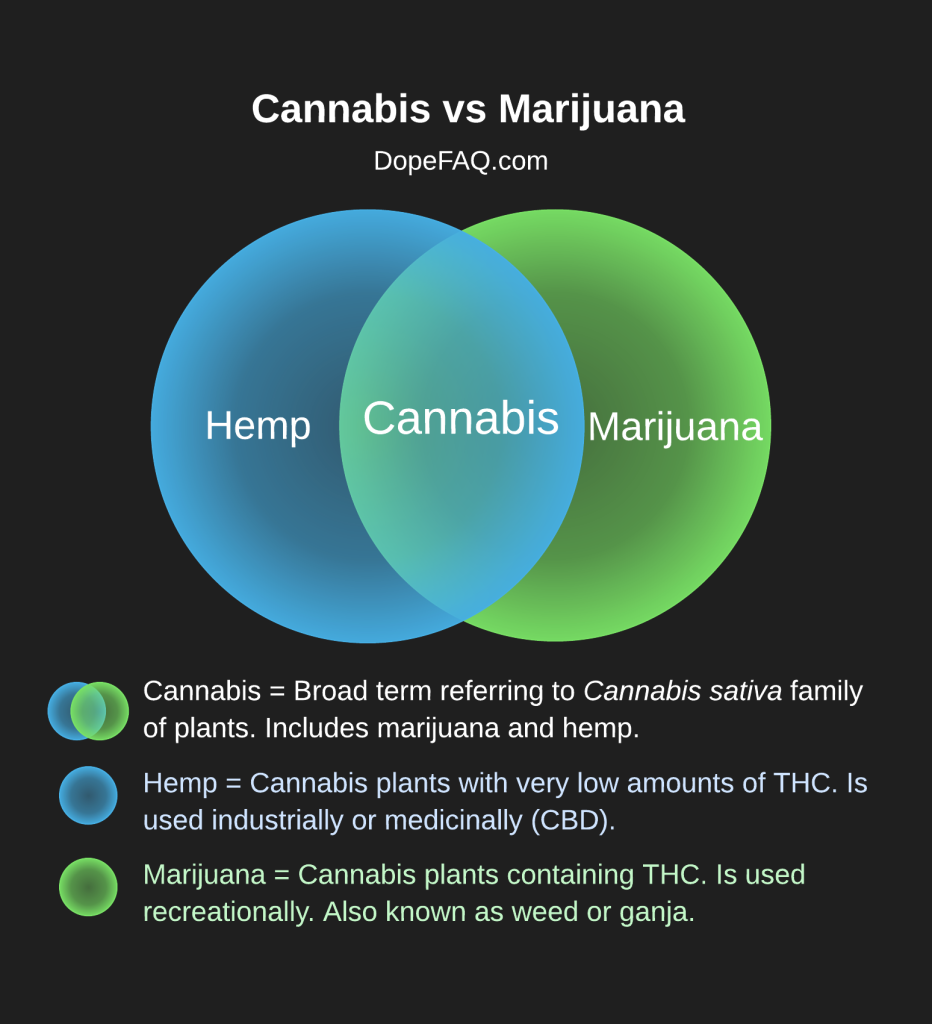Cannabis is a term used to broadly describe Cannabis sativa, a leafy plant also known as marijuana or weed. It contains over 500 different chemical substances, with the most well-known being THC (tetrahydrocannabinol) and CBD.
Is Cannabis the Same as Marijuana?
Not exactly. While “cannabis” might refer to hemp or marijuana, marijuana is a term specifically used in reference to cannabis that contains notable levels of THC.
Cannabis vs Marijuana:
- Marijuana = Contains THC. Is used recreationally. Also known as weed or ganja.
- Cannabis = Broad term referring to medical, industrial and recreational uses of the Cannabis sativa family of plants. Includes marijuana and hemp.
- Hemp = Cannabis plants with very low amounts of THC. Is used industrially or medicinally (CBD).

What are its chemical components?
The main chemical components of marijuana are known as “cannabinoids.” The two most well-known cannabinoids are THC and cannabidiol (CBD). However there are about 540 known components of cannabis.
How long does THC stay in your system?
There is a great deal of variance regarding how long THC and other cannabinoids remain in the body, with the biggest factors being the potency and frequency of use.
THC can stay in the body for up to 90 days, possibly longer.
A very minor dose could fade away after a mere 24 hours, while an incredibly strong dose may linger in the body for up to a month before the body can fully break it down.
Sources and relevant studies:
- https://academic.oup.com/clinchem/article/60/2/361/5621641
- https://www.ncbi.nlm.nih.gov/pmc/articles/PMC3570572/
- https://www.ncbi.nlm.nih.gov/pmc/articles/PMC5396143/
How long does THC linger within the hair?
A hair test can detect THC up to 90 days after using marijuana.
How long does THC linger within the blood?
THC can be detected within blood mere moments after it enters the body and usually up to two days afterward. Some trace incidents recorded THC being present more than four weeks after the user last partook.
How long does THC linger within urine?
Someone who partakes no more than thrice a week can fully metabolize it within 72 hours but someone who partakes multiples times a day will have traces of THC sitting around in their body for 30 days or more.
Also see:
https://www.healthline.com/health/how-long-does-weed-stay-in-your-system
What is THC-A?
THC-A is an acid form of THC that can converted into THC through certain devices like water pipes and dab rigs. While it is not exactly the same as raw THC, the fact that it can be converted into substances like hashish and hash oil to induce similar effects as strong marijuana within a person leaves future legislation an option.
What are Trichomes?
These growths are a natural defense mechanism of cannabis. The cannabis plant grows “trichomes” as it flowers so that it smells unappealing and also develops a bitter taste, making a hungry animals reconsider the plant as a suitable meal.
Cannabis Withdrawal?
Although there is very little academic research into cannabis withdrawal, most longtime users agree to there being some withdrawal affects from cannabis.
The most commonly reported withdrawal symptoms for cannabis users include:
- Trouble sleeping
- Leg kicks
- Irritability
Which countries have made cannabis legal?
Countries Where Cannabis is Legal
Canada, Uruguay, Georgia and the United States (certain states, territories and Washington, D.C.).
Countries Where Cannabis is Decriminalized?
Argentina, Austria, Barbados (if the user is Rastafarian), Belgium, Belize, Bermuda, Bolivia, Chile, Columbia, Costa Rica, Croatia, Czech Republic, Ecuador, Estonia, Israel, Italy, Jamaica, Luxembourg, Malta, Moldova, the Netherlands, Paraguay, Peru, Portugal, Russia, Saint Kitts and Nevis, Saint Vincent and the Grenadines, Slovenia, South Africa, Spain (private residence only) Switzerland (0.99% THC maximum), Trinidad and Tobago, the United States (certain states and territories) and Uruguay.
Countries where Medical Cannabis is Legal?
Australia (certain parts) Brazil, Ecuador, Finland, Germany, Ghana, Greece, Ireland, Israel, Italy, Jamaica, South Korea (with only certain substances), Lebanon, Lithuania, Luxembourg, Malawi, Malta, New Zealand, North Macedonia, Norway, Pakistan (only CBD), Peru, Poland (1.9% THC maximum), Portugal, Romania (1.9% THC maximum dosage), Saint Vincent and the Grenadines, San Marino, Slovenia, Spain (limited options), Sri Lanka, Switzerland, Thailand, Turkey (limited options), United Kingdom, the United States (certain states, territories and Washington, D.C.), Uruguay, Vanuatu, Zambia and Zimbabwe.
What’s the difference between cannabis legalization vs decriminalization?
Decriminalized means laws criminalizing cannabis were removed, but no specific legislation governing it’s production, or consumption exists either. Decriminalization can be seen as a purgatory, though not necessary being a “bad” thing or inferior to “legalization”. Legalization comes with laws, whereas decriminalization removes them.
Additionally, “legal” and “decriminalized” jurisdictions have varying levels of tolerance for cannabis-use and may limit the amount or potency of cannabis that a person can have on his person or in his home. In other words; it’s complicated 🙂
What are good sources online for educators about cannabis?
Educators and other professionals can feel confident using these sources in their cannabis-related research:
- The National Center for Complementary and Integrative Health (NCCIH) has done several studies regarding the pain-blocking effects of cannabis.
- PubMed is a division of the United States National Library of Medicine (NLM) and contains links to, and summaries of, hundreds of medical papers that cover subjects like cannabis and the medicinal benefits it can provide.
- MedlinePlus is yet another division of the NLM that seeks to present an authoritative assessment of all sorts of medical topics based on information from the National Institute of Health and other branches of the United States government.
- Wikipedia is always a good starting point for any topic of study. The article on cannabis contains over a dozen suggestions for additional reading and more than 125 references.
Also see:
https://www.nccih.nih.gov/health/cannabis-marijuana-and-cannabinoids-what-you-need-to-know